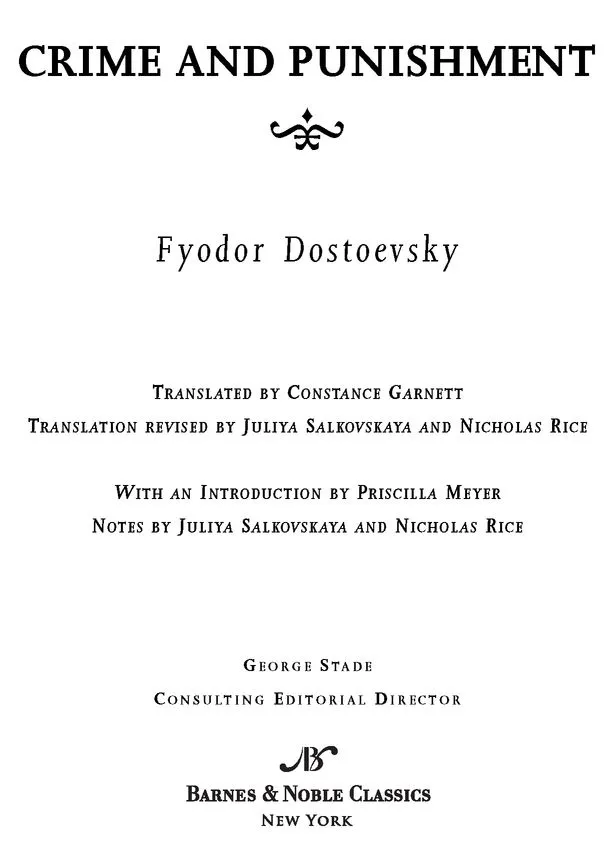“You, Rodion Romanovich! You are the murderer,” he added almost in a whisper, in a voice of genuine conviction. (page 433)
“You’re a gentleman,” they used to say. “You shouldn’t hack about with an axe; that’s not a gentleman’s work.” (page 517)


BARNES & NOBLE CLASSICS
NEW YORK
Published by Barnes & Noble Books
122 Fifth Avenue
New York, NY 10011
www.BookishMall.com.com/classics
Dostoevsky’s Prestupleniye i nakazaniye was originally published in Russian in 1866.
Constance Garnett’s translation of Crime and Punishment was first published in 1914.
Published in 2007 by Barnes & Noble Classics with new Introduction,
List of Characters, Notes, Biography, Chronology, Inspired By,
Comments & Questions, and For Further Reading.
Introduction, List of Characters, and For Further Reading
Copyright © 2007 by Priscilla Meyer.
Note on Fyodor Dostoevsky, The World of Fyodor Dostoevsky and
Crime and Punishment, Notes, Inspired by Crime and Punishment,
Comments & Questions, and revisions to the Constance Garnett
translation by Juliya Salkovskaya and Nicholas Rice
Copyright © 2007 by Barnes & Noble, Inc.
All rights reserved. No part of this publication may be reproduced or transmitted
in any form or by any means, electronic or mechanical, including photocopy,
recording, or any information storage and retrieval system, without the
prior written permission of the publisher.
Barnes & Noble Classics and the Barnes & Noble Classics
colophon are trademarks of Barnes & Noble, Inc.
Crime and Punishment
ISBN-13: 978-1-59308-081-5 ISBN-10: 1-59308-081-6
eISBN : 978-1-411-43201-7
LC Control Number 2004102189
Produced and published in conjunction with:
Fine Creative Media, Inc.
322 Eighth Avenue
New York, NY 10001
Michael J. Fine, President and Publisher
Printed in the United States of America
QM
1 3 5 7 9 10 8 6 4 2
FIRST PRINTING
FYODOR DOSTOEVSKY
Fyodor Mikhailovich Dostoevsky was born in Moscow on October 30, 1821. His mother died when he was fifteen, and his father, a former army surgeon, sent him and his older brother, Mikhail, to preparatory school in St. Petersburg. Fyodor continued his education at the St. Petersburg Academy of Military Engineers and graduated as a lieutenant in 1843. After serving as a military engineer for a short time, and inheriting some money from his father’s estate, he retired from the army and decided instead to devote himself to writing.
Dostoevsky won immediate recognition with the 1846 publication of his first work of fiction, a short novel titled Poor Folk. The important Russian critic Vissarion Grigorievich Belinsky praised his work and introduced him into the literary circles of St. Petersburg. Over the next few years Dostoevsky published several stories, including “The Double” and “White Nights.” He also became involved with a progressive group known as the Petrashevsky Circle, headed by the charismatic utopian socialist Mikhail Petrashevsky. In 1849 Tsar Nicholas I ordered the arrest of all the members of the group, including Dostoevsky. He was kept in solitary confinement for eight months while the charges against him were investigated and then, along with other members of Petrashevsky’s group, was sentenced to death by firing squad. At the last minute Nicholas commuted the sentence to penal servitude in Siberia for four years, and then service in the Russian Army. This near-execution haunts much of Dostoevsky’s subsequent writing.
The ten years Dostoevsky spent in prison and then in exile in Siberia had a profound effect on him. By the time he returned to St. Petersburg in 1859, he had rejected his radical ideas and acquired a new respect for the religious ideas and ideals of the Russian people. He had never been an atheist, but his Christianity was now closer to the Orthodox faith. While in exile he had also married.
Dostoevsky quickly resumed his literary career in St. Petersburg. He and his brother Mikhail founded two journals, Vremia (1861-1863) and Epokha (1864-1865). Dostoevsky published many of his well-known post-Siberian works in these journals, including The House of the Dead, an account of his prison experiences, and the dark, complex novella “Notes from Underground.”
The next several years of Dostoevsky’s life were marked by the deaths of his wife, Maria, and his brother Mikhail. He began to gamble compulsively on his trips abroad, and he suffered from bouts of epilepsy. In 1866, while dictating his novel The Gambler to meet a deadline, he met a young stenographer, Anna Snitkina, and the two married a year later. Over the next fifteen years Dostoevsky produced his finest works, including the novels Crime and Punishment (1866), The Idiot (1868), The Possessed (1871-1872), and The Brothers Karamazov (1879-1880). His novels are complex psychological studies that examine man’s struggle with such elemental issues as good and evil, life and death, belief and reason.
1 comment